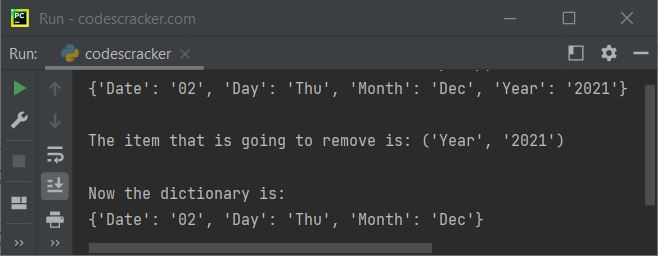- Python Built-in Functions
- Python All Built-in Functions
- Python print() Function
- Python input() Function
- Python int() Function
- Python float() Function
- Python len() Function
- Python range() Function
- Python str() Function
- Python ord() Function
- Python chr() Function
- Python ascii() Function
- Python pow() Function
- Python type() Function
- Python List Functions
- Python list() Function
- Python insert() Function
- Python append() Function
- Python extend() Function
- Python pop() Function
- Python remove() Function
- Python reverse() Function
- Python sort() Function
- Python sorted() Function
- Python Dictionary Functions
- Python dict() Function
- Python update() Function
- Python get() Function
- Python keys() Function
- Python setdefault() Function
- Python fromkeys() Function
- Python items() Function
- Python popitem() Function
- Python Tuple Function
- Python tuple() Function
- Python Set Functions
- Python set() Function
- Python frozenset() Function
- Python String Functions
- Python split() Function
- Python join() Function
- Python format() Function
- Python replace() Function
- Python Iterator Functions
- Python iter() Function
- Python min() Function
- Python max() Function
- Python sum() Function
- Python count() Function
- Python index() Function
- Python copy() Function
- Python clear() Function
- Python next() Function
- Python filter() Function
- Python enumerate() Function
- Python zip() Function
- Python reversed() Function
- Python Number Functions
- Python abs() Function
- Python bin() Function
- Python oct() Function
- Python hex() Function
- Python round() Function
- Python divmod() Function
- Python complex() Function
- Python File Handling Functions
- Python open() Function
- Python read() Function
- Python readable() Function
- Python readline() Function
- Python readlines() Function
- Python write() Function
- Python writable() Function
- Python writelines() Function
- Python close() Function
- Python seek() Function
- Python tell() Function
- Python flush() Function
- Python fileno() Function
- Python truncate() Function
- Python Class Functions
- Python object() Function
- Python property() Function
- Python getattr() Function
- Python setattr() Function
- Python hasattr() Function
- Python delattr() Function
- Python classmethod() Function
- Python staticmethod() Function
- Python issubclass() Function
- Python super() Function
- Python Misc Functions
- Python all() Function
- Python any() Function
- Python isatty() Function
- Python bool() Function
- Python callable() Function
- Python globals() Function
- Python locals() Function
- Python dir() Function
- Python id() Function
- Python isinstance() Function
- Python map() Function
- Python repr() Function
- Python slice() Function
- Python vars() Function
- Python Advance Functions
- Python help() Function
- Python hash() Function
- Python breakpoint() Function
- Python bytes() Function
- Python bytearray() Function
- Python memoryview() Function
- Python compile() Function
- Python eval() Function
- Python exec() Function
- Python Tutorial
- Python Tutorial
- Python Examples
- Python Examples
Python popitem() function
The popitem() function is used to remove the last item from a specified dictionary. For example:
x = {"Date": "02", "Day": "Thu", "Month": "Dec", "Year": "2021"}
print(x)
x.popitem()
print(x)
The output will be:
{'Date': '02', 'Day': 'Thu', 'Month': 'Dec', 'Year': '2021'}
{'Date': '02', 'Day': 'Thu', 'Month': 'Dec'}
Note: If you heard about popitem(), it removes an item from a specified dictionary, randomly, instead of the last one. Then let me tell you, yes, it was true, but before Python Version 3.7.
Python popitem() function syntax
The syntax of the popitem() function in Python is:
dictionaryName.popitem()
It returns the removed item.
Python popitem() function example
Here is an example of popitem() in Python:
x = {"Date": "02", "Day": "Thu", "Month": "Dec", "Year": "2021"}
print(x)
print("\nThe item that is going to remove is:", x.popitem())
print("\nNow the dictionary is:")
print(x)
The snapshot given below shows the sample output produced by this Python program, demonstrating the popitem() function:

Advantages of the popitem() function in Python
- Because the "popitem()" function is built into Python, it is readily available to all Python programmers.
- The "popitem()" function can remove and return any (key, value) item from a dictionary, which is useful in situations where the order of the items in the dictionary is unimportant.
- Regardless of the size of the dictionary, the "popitem()" function can remove and return an item from it in constant time.
Disadvantages of the popitem() function in Python
- The "popitem()" function eliminates a random (key, value) item from the dictionary, which in some circumstances may not be what is wanted. This might cause the program to act in an unexpected way.
- When specific items need to be deleted from the dictionary, the "popitem()" function might not be appropriate. Other dictionary methods like "pop()" or "del" may be more appropriate in such circumstances.
- If the dictionary is empty, the "popitem()" function may raise a KeyError, which may result in programming errors. It is crucial to appropriately handle these exceptions as a result.
« Previous Function Next Function »